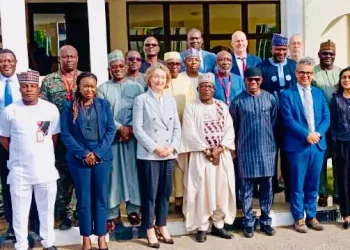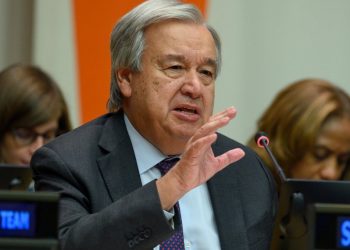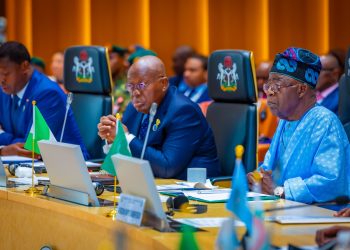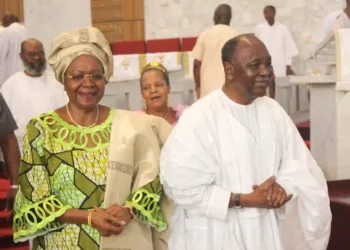The International Monetary Fund (IMF) alongside some economic experts have projected an optimistic economic outlook for the Nigerian economy provided certain macroeconomic fundamentals and policies are met.
They made the assertion at the American Business Council (ABC) in partnership with KPMG Nigeria event with the theme: “The Opportunities and Imperatives for Business” on Wednesday in Lagos.
IMF had projected a growth rate of 2.7 per cent for Nigeria in 2022.
Mr Ari Aisen, IMF Country Representative to Nigeria, said the IMF had due to the COVID-19 pandemic extended emergency assistance of $6.8 billion in 2020 and 2021 to contain the negative impact of the pandemic.
Aisen noted that reports showed progress in the health sector with the Nigerian authorities responding in the best way possible to contain the pandemic albeit not so much progress in some other sectors of its economy.
He, however, stressed the need for the overall economic policy framework to change by adopting the right instruments to engender growth and development.
The IMF rep emphasised that accessibility to foreign exchange for import was fundamental to growing the private sector which was identified as the main engine for economic growth.
He added that on the fiscal side, revenue mobilisation needed to be shored up as reports showed that Nigeria collected the least in revenue when compared to Gross Domestic Product (GDP) ratio among emerging countries.
“It is very difficult to make improvements in socioeconomic indicators with such a low level of revenue to GDP ratio.
“Therefore, strengthening tax administration, increasing tax compliance, using digitalisation to broaden the tax base is essential and also considering eventually to raise the Value Added Tax (VAT) rates to levels that are closer to the regional averages.
“The country also needs policy reforms that are more oriented to creating a more conducive environment for the private sector together with taking advantage of the Africa Continental Free Trade Area (AfCFTA),” he said.
Prof. Bongo Adi, Associate Professor, Department of Economics, Lagos Business School, noted that the country finished on a very strong note in 2021 with the biggest boost from oil prices that rebounded.
Adi noted that oil still had about 50 more years of dominance because the technologies driving manufacturing still leaned towards fossil fuel.
He stressed the need to shore local capacity and production volume to enable the nation to benefit from external crisis such as the Russian/Ukraine conflict that could favour export commodities for the country.
“External crisis has always favoured export commodities in Nigeria and so there’s need to shore up production volume of oil which is around 1.4 million barrels daily against the over two million barrels projected to improve earnings.
“Again, local content capacity shows that Nigeria is not on the budget of many of these major oil multinationals.
“This is an opportunity for these local investors to step into the gap they left so that whatever we get from oil sales can be used for the development of the country,” he said.
The Economist, however, reinforced the need for government to improve the country’s manufacturing capacity to drive import substitution by scaling up the work on rail infrastructure.
“Once that happens, you eliminate the logistics constraints for manufacturers seeing that this is one infrastructure that no company can solve for itself.
“There’s no innovation in rail and other logistics capacity; so this is where government should concentrate on as manufacturing runs on rails and not on roads,” he said.
Mr Justice Derefaka, Technical Adviser, Gas Business & Policy Implementation, said that in 2022 the implementation of the contents of the Petroleum Industry Act (PIA) would transform Nigeria into a hub of huge business opportunities.
He said this would come with high returns for investments particularly in the gas sector.
He, however, called for the necessary critical infrastructure such as virtual pipelines aimed at easing the transportation and logistics of gas to maximise the potential of the sector.
“PIA would spur and serve as a resurgence of our economic development.
“2022 would be declared the year of gas with gas projected to bring in over $1billion annually, and create about 300,000 direct and indirect jobs across the country,” he said.
Mr Dinesh Rathi, Chief Executive Officer, Lagos Free Zone, stressed the need for the three factors – good policy, availability of finance and support infrastructure – that spur the manufacturing sector to be in place.
He said that once those ingredients worked well, there was potential for the Nigerian manufacturing sector to grow to double digits.
He stressed the need to leverage the country’s abundant gas supplies by using natural gas as source of energy to make the manufacturing sector more internationally competitive due to its lower energy costs.
“The infrastructure at the Lagos Free Zone, with regard to energy, roads, efficient port system to be finished by the end of the year, among others has ensured ease of doing business for those operating in that environment.
“With those things, it is a perfect world for operators to come and thrive,” he said.












